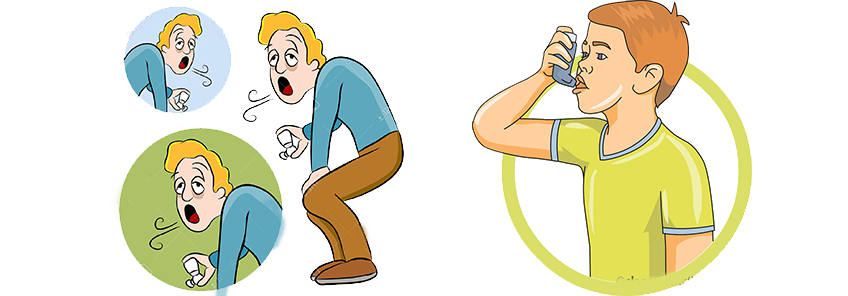Asthma

- Cough that is bothersome at night and early morning.
- Wheezing sound during breathing.
- Shortness of breath.
- Family history of asthma;
- Presence of other allergic disease like eczema, rhinitis;
- Overweight/Obesity;
- Smoke exposure active or passive;
- Occupation exposure to fumes, dusts, chemicals like hairdressing;
- Environmental pollution like vehicle exhaust fumes;
- Avoid things that make your asthma symptoms worse. Smoking or exposure to smoking should be strictly avoided. Regular dusting of carpets and curtains, avoiding pets or dolls with fur and pollens in certain seasons and keeping yourself from catching cold would help you get rid of asthma attacks.
- Physical activity might make your symptoms worse but it is an important part of a healthy lifestyle.
- Take your medicines regularly, if any, as your doctor prescribes.
- Talk to your doctor, if you think your medicine is not working properly to manage your asthma.
- Always communicate with your doctor if you have difficulty following your treatment plan or need to make changes.
Asthma is a chronic respiratory disease that affects your airways (windpipe). The windpipe is inflamed, narrowed and swollen that causes difficulty in breathing now and then. A person with asthma has no difficulty in breathing most of the time except during an asthma attack. Asthma is more common in children. However a child may become asthma free as they grow older. Whereas, it is a disease of lifetime in adults where the symptoms fluctuate. Asthma attacks are usually easily treated but it can be fatal in some cases. Asthma attacks are precipitated by exposure to triggering agents.
Causes
It is generally thought that genetic and environmental factors contribute to the development of asthma, but the exact cause still remains unknown. Many things can make asthma worse, such as exposure to cold air, air pollution, cigarette smoke, dust, pollens and sometimes physical activities or even a prolonged laughter. When you catch cold or have chest infection, you may also have worsening of asthma symptoms. Asthma generally runs in family along with other allergic conditions like eczema, allergic rhinitis. However you can develop asthma without a family history of asthma. You can develop asthma during exercise (called exercise induced asthma) or you may develop at work due to exposure chemical and dust at work (called work related asthma).
Signs and symptoms
Three cardinal symptoms of asthma are:
You may also feel chest tightness or chest pressure. However, you may not have all the symptoms all the time and your symptoms may differ between episodes. Sometimes, a cough that does not resolve may be the only indication of asthma. It is called a cough variant asthma.
Risk factors
These conditions increase your risk of developing asthma:
Diagnosis
Asthma is diagnosed based the symptoms and risk factors. A chest x-ray is done to rule out other causes of difficulty in breathing. Your doctor may also order certain breathing tests and allergy tests to confirm the diagnosis.
Treatment
Asthma is not a curable disease but its symptoms can be controlled. Another goal of asthma treatment is to prevent asthma attacks. Apart from avoidance of triggers, your doctor will prescribe you medication that are inhaled into the lungs. There are two types of these inhaled medicines.They are:
Reliever medicines: These are used whenever you feel shortness of breath. These medication effect start quick but last for short period. These medicines are taken 4-6 times daily. Mild cases of asthma can be managed with this short acting inhalers.
Controller medicines: When asthma symptoms are more frequent you need a medicine that last longer. These are taken only once or twice daily.
Some asthma attacks can be managed at home some need hospital admission. If you get hospitalised, you will be given oxygen. Asthma attacks are usually treated with oral steroids.
There are certain conditions associated with asthma that makes asthma control difficult. Diagnosing and treating those conditions are also very important. Those conditions include obesity, gastroesophageal reflux disease, sinusitis and obstructive sleep apnea.
Prevention
You may have an increased genetic susceptibility to asthma but you can modify the environmental risk factors to prevent asthma or its episodes of attack:



Send us your feedback on this article